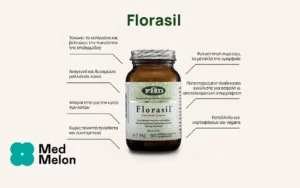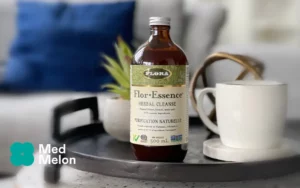Scientific Names of Eucalyptus Oil:
Eucalyptus globulus LABILL., E. fructicetorum F. Von Mueller (syn. E. polybractea R. T. Baker), E. smithii R. T. Baker and other species [Fam. Myrtaceae]
Forms:
Volatile oil extract of the leaves and branch tops of eucalyptus species
Traditional Usage:
– Antibacterial
– Anti-candidiasis
– Antifungal
– Antimicrobial
– Antiseptic
– Antiviral
– Bad Breath
– Bone and Joint Pain
– Breathing Disorders
– Bronchial Congestion
– Bronchitis
– Chest Rub
– Coughs
– Emphysema
– Expectorant
– Fainting Prevention
– Halitosis
– Nasal Congestion
– Pain (topically)
– Sinusitis
– Sore Throat
– Stimulant
– Tuberculosis
– Viral Infections
– Yeast Infections
Overview:
Eucalyptus trees, Eucalyptus globulus LABILL., and other Eucalyptus species [Fam. Myrtaceae], are tall evergreens native to Australia and Tasmania that are now grown in many different parts of the world. Approximately 25 different species are used in the production of medicinal eucalyptus oil. Eucalyptus oil is rich in 1,8-cineole, otherwise known as eucalyptol; a compound noted for its anesthetic, anti-bronchitic, anti-catarrh, anti-laryngitic, stimulant and expectorant properties, among other activities. The German Commission E approves the internal use of eucalyptus oil for treating catarrhs (mucous) of the respiratory tract and externally for use against bone and joint pain. Eucalyptus oil is an active ingredient in such familiar over-the-counter remedies as mentho-lyptus cough drops, Vicks VapoRub and Mentholatum ointment. Rubbed on the skin, eucalyptus oil creams stimulate circulation and act as a safe and effective rubefacient that produces local vasodilation and an increase in blood supply to the area of application. Taken internally, the essential oil of eucalyptus is secreted through the lungs, so it produces an antiseptic, cooling and expectorant effect right where it is needed. Dr. James Duke, author of The Green Pharmacy, also notes the use of it as a ‘smelling salt’ for preventing fainting, as well as for treating bad breath, bronchitis, emphysema, pain, sinusitis, sore throat, tuberculosis and viral infections. Interestingly, the effects of five minutes exposure to eucalyptus, menthol or camphor vapour showed that none of these oils clear nasal passages but the majority of subjects reported a cold sensation in the nose with the sensation of improved airflow, which does have clinical significance. Taken internally, it has mucolytic and expectorant actions. It also shows strong antifungal, broad-spectrum antimicrobial activity against several drug-resistant bacteria, and activity against Candida albicans. A clinical trial with a 1% ointment cured 60% of patients with fungal infections.
Active Ingredients:
Eucalyptus oil contains: 70-85% 1,8-cineole otherwise known as eucalyptol, as the most abundant component; triterpenes including ursolic acid derivatives; monoterpenes including alpha- and beta-pinene, p-cymene, alpha-phellandrene, camphene, gamma-terpinene and d-limonene; sesquiterpenes including aromadendrene, alloaromadendrene and globulol; aldehydes including myrtenal; ketones including carvone and pinocarvone.
Suggested Amount:
The dosage of eucalyptus oil for internal use ranges from 0.3-0.6g per day of essential oil in diluted form or other galenical preparations. For external use, eucalyptus oil is diluted in a suitable carrier oil, such as almond or avocado, with the ratio of 30ml essential oil for every 500ml of carrier oil. Ointments can also be prepared using 1-20% essential oil in a base of paraffin, petroleum jelly or vegetable oil for local application. A clinical trial showing significant results without relapse within 2 months used a 1% ointment for two weeks. A tincture can also be prepared using 5-10% essential oil for local application. As an inhalant, a few drops of essential oil are added to hot water or a vaporizer and the steam is deeply inhaled. For use as a smelling salt alternative, simply place a few drops on a cloth and place under the nose of the faint person. Eucalyptus oil should be diluted before internal or external use.
Drug Interactions:
The Commission E notes that eucalyptus oil stimulates liver detoxification enzymes and therefore may weaken and/or shorten the effects of other drugs.
Contraindications:
Eucalyptus oil is contraindicated for internal use during pregnancy. Eucalyptus oil may also interfere with existing hypoglycemia therapy. Eucalyptus oil should be diluted before internal or external use.
Side Effects:
Externally, properly diluted eucalyptus oil is stated to be generally non-toxic, non-sensitizing and non-phototoxic. Eucalyptus oil shows strong antifungal activity (at 1.0 microl/ml) against human pathogenic fungi without any adverse effects on mammalian skin up to 5% concentrations. Undiluted eucalyptus oil is toxic and should not be applied externally or taken internally unless suitably diluted. A dose of 3.5ml has proved fatal, though this is not the usual outcome of eucalyptus oil poisoning – most people/children recover.
Retrospective Analysis of Eucalyptus Oil Poisoning:
A recently published retrospective analysis of case histories of children admitted to the Royal Children’s Hospital, Melbourne, between January 1981 and December 1992 with a diagnosis of eucalyptus oil poisoning found that all patients recovered. A total of 109 children (mean age, 23.5 months; range, 0.5-107) were admitted; clinical effects were observed in 59%. Thirty-one (28%) had depression of conscious state; 27 were drowsy, three were unconscious after ingesting known or estimated volumes of between 5 ml and 10 ml, and one was unconscious with hypoventilation after ingesting an estimated 75 ml. Vomiting occurred in 37%, ataxia in 15% and pulmonary disease in 11%. No treatment was given for 12%. Ipecac or oral activated charcoal was given for 21%, nasogastric charcoal for 57%, and gastric lavage without anaesthesia for 4% and under anaesthesia for 6%. Hazardous treatment and overtreatment were common. For 105 children, mean hospital stay was 22 hours (range, 4-72 h) and for 13 patients mean intensive care unit stay was 18 hours (range, 4-29 h). In 27 patients who ingested known doses of eucalyptus oil, 10 had nil effects after a mean of 1.7 mL, 11 had minor poisoning after a mean of 2.0 mL, five had moderate poisoning after a mean of 2.5 mL and one had major poisoning after 7.5 ml. The researchers concluded that ingestion of eucalyptus oil caused significant morbidity in infants and young children. Significant depression of conscious state should be anticipated after ingestion of 5 mL or more of 100% oil. Minor depression of consciousness may occur after 2-3 mL. Airway protection should precede gastric lavage.
[Tibballs J. 1995. Clinical effects and management of eucalyptus oil ingestion in infants and young children. Med J Aust. 1995 Aug 21; 163(4): 177-80.]
References:
Ahmad I, Beg AZ. 2001. Antimicrobial and phytochemical studies on 45 Indian medicinal plants against multi-drug resistant human pathogens. J Ethnopharmacol. 2001 Feb; 74(2): 113-23.
Blumenthal M, Goldberg A, Brinckmann J 2000. Herbal Medicine: Expanded Commission E Monographs. Copyright American Botanical Council. Publ. by Integrative Medicine Communications, 1029 Chestnut Street, Newton, MA 02464. Pp. 118-123.
Burrow A, Eccles R, Jones AS. 1983. The effects of camphor, eucalyptus and menthol vapour on nasal resistance to airflow and nasal sensation. Acta Otolaryngol. 1983 Jul-Aug; 96(1-2): 157-61.
Duke JA. 1992a. Handbook of Biologically Active Phytochemicals and their Activities. CRC Press, Boca Raton, FL, p. 30.
Shahi SK, Shukla AC, Bajaj AK, Banerjee U, Rimek D, Midgely G, Dikshit A. 2000. Broad spectrum herbal therapy against superficial fungal infections. Skin Pharmacol Appl Skin Physiol. 2000 Jan-Feb; 13(1): 60-4.




